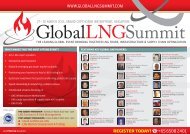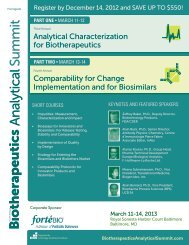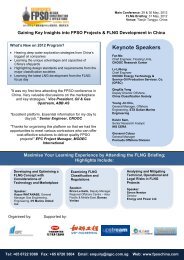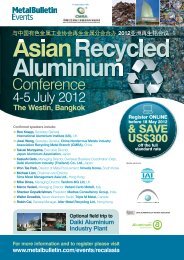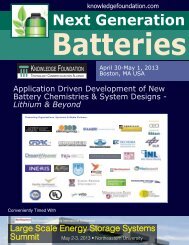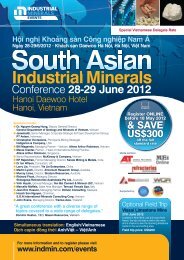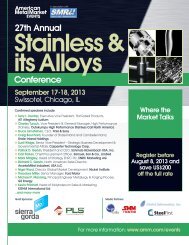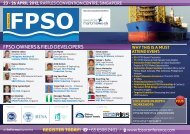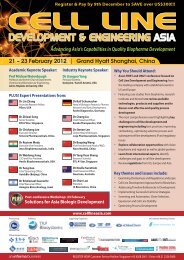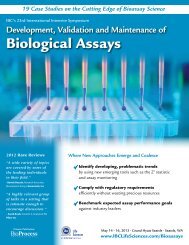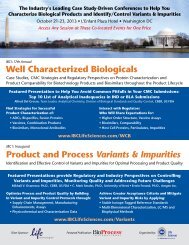Full Conference Details Inside
Full Conference Details Inside
Full Conference Details Inside
You also want an ePaper? Increase the reach of your titles
YUMPU automatically turns print PDFs into web optimized ePapers that Google loves.
Symposium #5: Best Practices in<br />
Cleaning and Cleaning Validation<br />
A Science-based and Integrated Approach<br />
for Biopharmaceuticals<br />
Room ???<br />
In this symposium we will identify the elements of a<br />
robust cleaning program for biopharmaceuticals. we will<br />
then see how each element is systematically developed<br />
and integrated to ensure successful implementation.<br />
The symposium will cover current regulatory<br />
expectations, science-based methodologies for cleaning<br />
characterization, and the lifecycle approach to cleaning<br />
validation and monitoring.<br />
In addition to the fundamentals of cleaning,<br />
this symposium will also cover the following<br />
advanced topics:<br />
Agenda to include:<br />
• Unique cleaning challenges for multiproduct<br />
bioprocesses equipment.<br />
• Effective strategies for addressing these challenges<br />
through planned small-scale studies.<br />
• Degradation/inactivation studies and how they can<br />
be used to eliminate product-specific assays and the<br />
traditional MAC approach.<br />
• Acceptance limits for degraded/inactivated product.<br />
• Cleaning tenacious residues in bioreactors and media<br />
tanks.<br />
• The use of master soils to streamline and<br />
provide flexibility for scheduling cleaning validation<br />
activities.<br />
Instructor:<br />
Rizwan Sharnez Ph.D., Principal Engineer, Process<br />
Engineering,<br />
Amgen Inc.<br />
Pre-<strong>Conference</strong> Symposia • Monday, October 8, 2012 • 1:00 pm - 5:00 pm<br />
12:00 pm Registration<br />
Symposium #7:<br />
CMC Project Management<br />
throughout the Product<br />
Development Life Cycle<br />
Room ???<br />
The session will provide a comprehensive overview of<br />
phase-dependent CMC activities and the role of CMC<br />
teams in integrating development plans and facilitating<br />
progress. Talks will cover different models for managing<br />
CMC projects that are tied to company’s resources,<br />
number of products, and phase of development.<br />
Best practices in CMC PM be discussed in detail. The<br />
symposium is intended to provide participants with a<br />
broad understanding of the drug development process<br />
from discovery to commercialization and how CMC-<br />
PM can help integrate the strategic vision with tactical<br />
implementation.<br />
• Overview of Integrated Phase Dependent CMC<br />
Development<br />
• Best Practices in CMC Project Management<br />
• CMC structure: One Size Does Not Fit All<br />
• Bridging Discovery to Human Proof of Concept and<br />
Commercialization<br />
• CMC PM as a Career Path<br />
Talks will be followed by a panel discussion which will<br />
cover topics of interest to the audience and the speakers.<br />
Agenda to include:<br />
• Understand Product Development Life Cycle from a<br />
CMC perspective<br />
• Models for managing CMC activities throughout<br />
development life cycle<br />
• CMC PM organizational structures and functional<br />
roles<br />
• Risk Management processes to maneuver through<br />
development hurdles<br />
• CMC PM business processes, tools and templates<br />
• Managing in-licensed products, partnerships, and<br />
CROs<br />
• Interactive discussions with peers and experts in<br />
managing CMC development<br />
Co-Chairpersons:<br />
Seshu Tyagarajan, Ph.D., Associate Director, CMC<br />
Project Management, ImClone Systems, a whollyowned<br />
subsidiary of Eli Lilly and Company<br />
Zahra Shahrokh, Ph.D., Biotech Product Development<br />
Consultant, ZDev Consulting<br />
Symposium #8:<br />
Microbial Protein<br />
Production Systems<br />
Room ???<br />
Microbial systems are being used to express a growing<br />
number of early stage protein products, circumventing<br />
issues such as viral clearance associated with CHO and<br />
other mammalian platforms, offering lower media costs<br />
and much shorter bioreactor run times. Virtually every new<br />
“antibody-like” scaffold is selected for efficient microbial<br />
expression, thereby facilitating discovery and manufacture.<br />
While almost all approved antibodies and most of those<br />
in clinical development rely on mammalian cell culture for<br />
production, a rapidly growing number of smaller antibody<br />
fragments, scaffold-based therapeutics and other proteins<br />
are produced in microbial systems. These production<br />
platforms include various bacterial hosts, several species of<br />
yeasts, and other small eukaryotes. This session focuses on<br />
recent advances and improvements to microbial systems<br />
and case studies of protein production and manufacture.<br />
Agenda to include:<br />
• Gain an overview of microbial production systems.<br />
• Understand key advantages and challenges of<br />
bacterial and eukaryotic microbial hosts.<br />
• Insights into the latest improvements to established<br />
and novel microbial expression platforms.<br />
• Learn from case studies of current protein products<br />
manufactured by microbial process.<br />
• Be prepared for increasing applications of microbial<br />
systems for new products.<br />
Chairperson:<br />
David Bramhill, Ph.D.,<br />
Research Corporation Technologies and<br />
Bramhill Biological Consulting, LLC.<br />
7 To Register, Call: (800) 390-4078 • Fax: (941) 365-0104 • E-mail: reg@ibcusa.com • www.IBCLifeSciences.com/BPI



